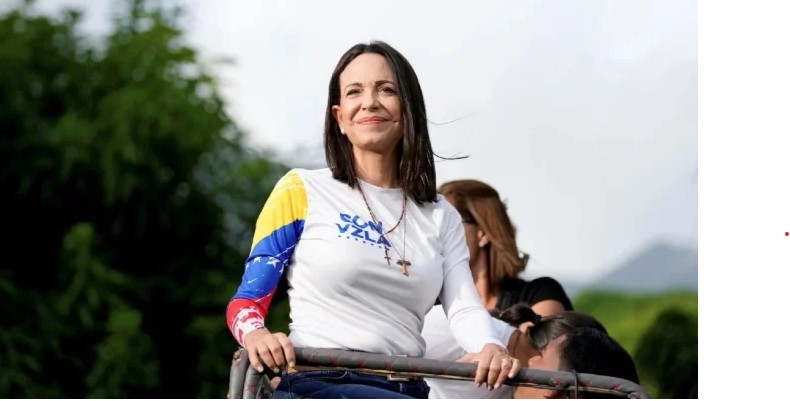Tahir Baloch

Oslo: Venezuelan opposition leader Maria Corina Machado has been awarded the 2025 Nobel Peace Prize for her “tireless work promoting democratic rights for the people of Venezuela” and her nonviolent struggle against authoritarian rule under President Nicolas Maduro.
Machado, 58, an industrial engineer and head of the opposition party Vente Venezuela, has lived largely in hiding since being barred from contesting the 2024 presidential election by Venezuela’s Supreme Court. Despite the ban, she remains the symbolic face of resistance to Maduro’s government, which has ruled since 2013.
The Nobel Committee, announcing the award in Oslo, said Machado “meets all the criteria stated in Alfred Nobel’s will” and praised her as “a courageous defender of freedom who has inspired millions by remaining in Venezuela despite threats to her life.”
In an emotional phone call released by the committee, Machado said, “I have no words. This is not mine alone—it belongs to an entire movement, to a society that refuses to give up.”
Dedication to Trump Sparks Political Controversy
Soon after the announcement, Machado wrote on social media platform X that she dedicates the prize “to the suffering people of Venezuela and to President Donald Trump for his decisive support of our cause.”
The dedication triggered sharp reactions from Washington, where the White House accused the Nobel Committee of ‘placing politics over peace’.
“President Trump will continue making peace deals, ending wars, and saving lives,” White House communications director Steven Cheung said in a post on X. “He has the heart of a humanitarian, and there will never be anyone like him.”
Trump, who has long voiced frustration at being overlooked for the Nobel, congratulated Machado in a private call, according to U.S. media reports.
A Symbol of Democratic Defiance
Machado is the first Venezuelan and sixth Latin American to win the Nobel Peace Prize. She rose to prominence in 2002 as co-founder of Súmate, a civic movement that organized a recall referendum against then-president Hugo Chávez.
Her political career has been marked by bans, threats, and accusations from the Maduro government. Many of her allies have been detained or forced into exile.
UN human rights officials welcomed the award as a “recognition of the Venezuelan people’s aspirations for free and fair elections.” Nobel Committee chair Jorgen Watne Frydnes said he hoped the recognition would “renew the opposition’s energy for a peaceful transition to democracy.”
Reactions at Home and Abroad
The announcement has drawn mixed reactions worldwide. Supporters called it a “victory for democracy,” while critics labeled it “politically motivated.”
Venezuela’s ruling party lawmakers condemned the decision as “shameful,” accusing Machado of “colluding with foreign powers.”
Meanwhile, some leftist politicians and activist groups—such as Spain’s Pablo Iglesias and U.S. Muslim advocacy group CAIR—criticized the award, citing Machado’s support for conservative movements and U.S. sanctions against Venezuela.
Uncertain Future
It remains unclear whether Machado will be able to attend the award ceremony in Oslo on December 10, joining past laureates such as Aung San Suu Kyi and Lech Wałęsa who were prevented from traveling due to political restrictions.
Her supporters hope the global recognition will bolster efforts to pressure Maduro’s government toward reform.
“When authoritarians seize power, it is crucial to recognize those who rise and resist,” the Nobel Committee said.
With the award, Machado joins a distinguished list of laureates whose advocacy has challenged dictatorship — and reignited global debate about whether peace prizes should reward political defiance or pure diplomacy.























